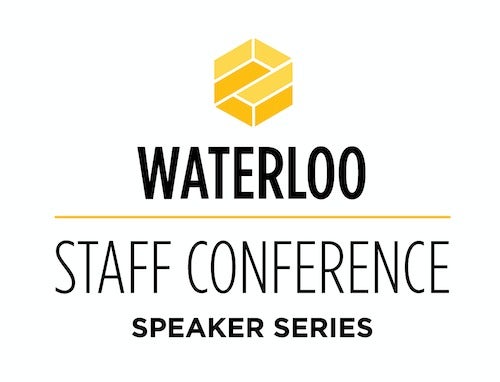- An electrifying new incentive
- System recognizes hand gestures to expand computer input on a keyboard
- Authority on preparing for the jobs of tomorrow to kick off OHD Speaker Series
- Professor receives award for study on employee knowledge sharing
- Hanging up on campus telephones
- Don't get held up: ransomware seminar coming on Friday
Editor:
Brandon Sweet
University Communications
bulletin@uwaterloo.ca
An electrifying new incentive

A message from the Sustainability Office.
Does your department have a vehicle in need of replacement? Have you considered exploring an electric option?
Waterloo is launching a new incentive for departments to electrify fleet vehicles. Any unit replacing a conventional combustion engine vehicle can receive a $10,000 internal incentive to convert to an electric vehicle (EV).
EVs will play an important part of reducing emissions from Waterloo’s fleet, which accounts for around 1 per cent of the campus’ total emissions. The campus has been expanding hybrid purchases over the past several years, and in 2021 purchased its first fully electric vehicle, but the pace of adoption needs to be accelerated to achieve the Waterloo’s climate action targets.
“One barrier that often comes up for EVs is the up-front purchase price,” says Mat Thijssen, Director of Sustainability. “Although there are many operational savings on energy and maintenance from an EV that make them cost-competitive or very close to cost-competitive over their lifespan, that up-front cost can be a challenge.”
The subsidy hopes to overcome that, and it can be combined with any other applicable government rebates or grants to support the EV purchase or charging station installation.
With many vehicle manufacturers expanding their EV product lines, there are a larger number of electric car, cargo van, and even truck options that can help build out a low-carbon fleet.
For more details on the funding program, visit the Sustainability Office website, or reach out to Mat Thijssen.
System recognizes hand gestures to expand computer input on a keyboard

This article was originally published on Waterloo News.
Researchers are developing a new technology that uses hand gestures to carry out commands on computers.
The prototype, called “Typealike,” works through a regular laptop webcam with a simple affixed mirror. The program recognizes the user’s hands beside or near the keyboard and prompts operations based on different hand positions.
A user could, for example, place their right hand with the thumb pointing up beside the keyboard, and the program would recognize this as a signal to increase the volume. Different gestures and different combinations of gestures can be programmed to carry out a wide range of operations.
The innovation in the field of human-computer interaction aims to make user experience faster and smoother, with less need for keyboard shortcuts or working with a mouse and trackpad.
“It started with a simple idea about new ways to use a webcam,” said Nalin Chhibber, a recent master’s graduate from the University of Waterloo’s Cheriton School of Computer Science. “The webcam is pointed at your face, but the most interaction happening on a computer is around your hands. So, we thought, what could we do if the webcam could pick up hand gestures?”
The initial insight led to the development of a small mechanical attachment that redirects the webcam downwards towards the hands. The team then created a software program capable of understanding distinct hand gestures in variable conditions and for different users. The team used machine learning techniques to train the Typealike program.
“It’s a neural network, so you need to show the algorithm examples of what you’re trying to detect,” said Fabrice Matulic, senior researcher at Preferred Networks Inc. and a former postdoctoral researcher at Waterloo. “Some people will make gestures a little bit differently, and hands vary in size, so you have to collect a lot of data from different people with different lighting conditions.”
The team recorded a database of hand gestures with dozens of research volunteers. They also had the volunteers do tests and surveys to help the team understand how to make the program as functional and versatile as possible.
“We’re always setting out to make things people can easily use,” said Daniel Vogel, an associate professor of computer science at Waterloo. “People look at something like Typealike, or other new tech in the field of human-computer interaction, and they say it just makes sense. That’s what we want. We want to make technology that’s intuitive and straightforward, but sometimes to do that takes a lot of complex research and sophisticated software.”
The researchers say there are further applications for the Typealike program in virtual reality where it could eliminate the need for hand-held controllers.
The study, Typealike: Near-keyboard hand postures for expanded laptop interaction, authored by Chhibber, Matulic, Vogel, and team-member Hemant Bhaskar Surale, was recently published in the journal for the proceedings of ACM Human Computer Interaction.
Authority on preparing for the jobs of tomorrow to kick off OHD Speaker Series

A message from Organizational and Human Development (OHD).

Dr. Michelle R. Weise has been announced as the first keynote in the Waterloo Staff Conference speaker series taking place in February and March. This OHD-hosted event, taking place on Tuesday, February 8, at 10:30 a.m., is open to all UWaterloo employees as we ramp up to the two-day Staff Conference taking place in early April.
“We are delighted to have Dr. Michelle R. Weise kick off the 2022 pre-conference speaker series,” says Melanie Will, Director of OHD. “Taking the best learnings from her award-winning book, research and experience, we will be inspired to new perspectives on continuing education and preparing ourselves for the future of work.” Michelle is a sought-after scholar, speaker, consultant and widely recognized authority on preparing working-age adults for the jobs of today and tomorrow. She was named one of 30 management and leadership thinkers in the world to watch in 2021 by Thinkers50.
Michelle serves as an advisor to countless businesses and organizations, and in 2020 published Long-Life Learning: Preparing for Jobs that Don’t Even Exist Yet. Her commentaries on redesigning higher education and developing more innovative workforce and talent pipeline strategies have been featured in The Economist, The Wall Street Journal, The New York Times, Harvard Business Review and on PBSNewshour.
Registration is now open on Portal.
Professor receives award for study on employee knowledge sharing

By Patty Mah. This article was originally published on the School of Accounting and Finance website.

School of Accounting and Finance Associate Professor Krista Fiolleau, PhD and her co-authors Leslie Berger, PhD and Carolyn MacTavish, PhD, associate professors at Wilfrid Laurier, were awarded the Best Paper Award from the Journal of Management Accounting Research (JMAR).
The Journal for Management Accounting Research is published by the American Accounting Association (AAA), the largest community of accountants in academia. Through its membership, leading-edge research, and publications, the AAA help to shape the future of accounting in expanding contributions to address key issues for scholarship, education, and practice. The JMAR Best Paper Award is presented annually to the JMAR paper deemed to have the greatest potential impact on management accounting research.
The award-winning paper, “I know something you don’t know: The effect of relative performance information and the individual performance incentives on knowledge sharing,” expands our understanding of counterproductive effects of knowledge sharing within a workplace that implements incentive systems and performance enhancing tools. In environments where sharing information between employees is useful, tools such as relative performance information (RPI) and individual performance incentives, can lead to losses in efficiency when employees choose not to share information or choose to share inaccurate information. The paper suggests that it may be useful for an organization to monitor metrics other than simply output performance effects when implementing tools to measure collaboration and sharing behaviour of their employees. The paper was originally published in the Summer 2019 volume of the Journal of Management Accounting Research.
Prof. Fiolleau is an associate professor with the School of Accounting and Finance at the University of Waterloo. An accredited Chartered Professional Accountant (CPA), Prof. Fiolleau’s research interests include accounting ethics, ethical reasoning, and use of accounting information in decision-making.
Hanging up on campus telephones

A message from Information Systems & Technology.
The University is seeking proposals for the supply and implementation of a modern unified communication solution, which will replace the current campus telephone and voicemail system. Implementation of the successful solution is expected to begin in mid-2022.
Motivation behind the change
The equipment and support for our current VOIP/Analog telephone environment (which uses Avaya and Skype for Business products) is reaching end of life. More recently, as we continue to adjust to the changing working and learning landscapes, it is important the University be able to provide a flexible solution that supports these distributed environments, better integrates with existing communication and collaboration tools, such as Microsoft Teams, while enhancing the overall user experience.
Please note, until the new solution is in place, units may continue to migrate to the Skype for Business softphone client. Information about the move to a primarily softphone client model is available on the project website.
Questions about this work can be directed to Steve Bourque, director, technology integrated systems, IST.
Don't get held up: ransomware seminar coming on Friday

The next entry in the Professional Development Advisory Group (PDAG) seminar series will feature Information Systems & Technology staff member Terry Labach and is entitled "Because That’s Where the Money is: Ransomware as a Growth Industry."
"Despite years of experience, Internet-based financial crime continues to plague businesses and organizations," says the talk's background blurb. "Financial losses due to ransomware continue, instigated by relentless cybercriminal gangs spread across the world. Higher education institutions are not immune to such attacks. Terry will review some of the most audacious ransomware attacks of the past few years. He’ll demonstrate how the victimized organizations were vulnerable and how they could have defended themselves. Could it happen here?"
Nathan Lee will moderate the event.
Terry Labach has worked at UWaterloo since 2004. He is currently a member of IST's Information Security Services team. He has previously worked supporting software infrastructure at University of Calgary, Enbridge Pipelines, IBM, and Maplesoft, and has also worked as a software developer at the University of Saskatchewan, the Saskatoon Cancer Centre, and Skyplan, where he wrote flight planning software. On a personal level, his musical life as a harmonica player and Kitchener Blues Festival volunteer has been disrupted by the COVID times. With gyms being closed so often during the pandemic, he has developed from an occasional runner to an obsessive runner.
Nathan Lee is a member of the Project Management Office in IST and has worked at UWaterloo since 2017. He is a co-chair in the PDAG committee.
The event takes place Friday, January 14 from 9:00 a.m. to 9:45 a.m. on Microsoft Teams. This session will be recorded. Visit the PDAG seminar page for upcoming events.
Link of the day
When and Where to get support
Students can visit the Student Success Office online for supports including academic development, international student resources, immigration consulting, leadership development, exchange and study abroad, and opportunities to get involved.
Finance and Student Financial Services will be closed to in-person service in EC5 until further notice. Students, please visit the Centre in Needles Hall or contact Student Financial Services at the helpdesk.
Instructors looking for targeted support for developing online components for blended learning courses, transitioning remote to fully online courses, revising current online courses, and more please visit Agile Development | Centre for Extended Learning | University of Waterloo (uwaterloo.ca).
Instructors can visit the Keep Learning website to get support on adapting their teaching and learning plans for an online environment.
Course templates are available within your course in LEARN to help you build and edit your content and assignment pages quickly.
The following workshops, webinars, and events are offered by the KL team (CTE, CEL, ITMS, LIB):
- Independent Remote Course Design Essentials, self-directed, continuous self-enrollment course in LEARN.
- Independent Blended Course Design (iBlend), self-directed, ongoing
- Copyright Overview for Waterloo Instructors and Staff - self-directed, continuous self-enrollment course in LEARN.
Employees can access resources to help them work remotely, including managing University records and privacy of personal information. Here are some tips for staying healthy while working from home.
Stay informed about COVID cases on campus by consulting the COVID case tracker.
The Writing and Communication Centre has virtual services and programs to help undergrads, grad students, postdocs and faculty members with academic writing.
- Meet with writing advisors in one-to-one appointments to brainstorm, draft, revise, and polish. No time for an appointment? Try email tutoring for undergrads.
- Beat isolation and make writing progress at weekly Virtual Writing Cafés for grad students and faculty or PJ-Friendly Writing Groups for Undergrads.
- Take an online workshop or apply to our popular Dissertation Boot Camp program.
- Faculty can request custom in-class workshops for their courses, or the WCC can facilitate any existing workshops for student groups.
- Course-integrated support available. Attention faculty and instructors: The application form for Writing and Communication Centre course-integrated support is now available online. We offer five unique support streams for your courses including synchronous and asynchronous workshops and monitored discussion boards.
Co-op students can get help finding a job and find supports to successfully work remotely, develop new skills, access wellness and career information, and contact a co-op or career advisor.
The Centre for Career Action (CCA) is currently offering virtual services only. Questions about CCA's services? Live chat or call 519-888-4047 between 8:30 a.m. and 4:30 p.m. EST, Monday to Friday.
Drop-in to Warrior Virtual Study Halls on Wednesdays from 5:30 p.m. to 7:00 p.m. Come together in this virtual space to set goals and work independently or in groups each week.
Renison's English Language Institute continues to offer virtual events and workshops to help students practice their English language skills.
If you feel overwhelmed or anxious and need to talk to somebody, please contact the University’s Campus Wellness services, either Health Services or Counselling Services. You can also contact the University's Centre for Mental Health Research and Treatment. Good2Talk is a post-secondary student helpline available to all students.
The Library will continue to focus on digital resources and consultations as we start winter term with classes primarily online, though spaces will be open for drop-in individual study space, bookable individual study rooms, drop-in access to computers and printers, book pick-up services and IST Help Desk support. Special Collections & Archives and the Geospatial Centre will be accessible by appointment. Full details on current services and hours are available on the Library’s COVID-19 Update webpage.
The Faculty Association of the University of Waterloo (FAUW) continues to advocate for its members. Check out the FAUW blog for more information.
The University of Waterloo Staff Association (UWSA) continues to advocate for its members. Check out the UWSA blog for more information.
The Sexual Violence Prevention and Response Office (SVPRO) supports all members of the University of Waterloo campus community who have experienced, or been impacted, by sexual violence. This includes all students, staff, faculty and visitors on the main campus, the satellite campuses, and at the affiliated and federated Waterloo Institutes and Colleges. For support, email: svpro@uwaterloo.ca or visit the SVPRO website.
The Office of Indigenous Relations is a central hub that provides guidance, support, and resources to all Indigenous and non-Indigenous campus community members and oversees the University's Indigenization strategy.
The Waterloo Indigenous Student Centre, based at St. Paul’s University College, provides support and resources for Indigenous students, and educational outreach programs for the broader community, including lectures, and events.
WUSA supports for students:
Peer support - MATES, Glow Centre, RAISE, Women’s Centre - Visit https://wusa.ca/peersupport to book an appointment either in person or online for the Fall term.
Food Support Service food hampers are currently available from the Turnkey Desk 24/7 in the Student Life Centre. Drop off locations are also open again in SLC, DC, DP, SCH and all residences.
Co-op Connection all available online. Check https://wusa.ca for more details.
Centre for Academic Policy Support - CAPS is here to assist Waterloo undergraduates throughout their experience in navigating academic policy in the instances of filing petitions, grievances and appeals. Please contact them at caps@wusa.ca. More information is available.
WUSA Student Legal Protection Program- Seeking legal counsel can be intimidating, especially if it’s your first time facing a legal issue. The legal assistance helpline provides quick access to legal advice in any area of law, including criminal. Just call 1-833-202-4571.
Empower Me is a confidential mental health and wellness service that connects students with qualified counsellors 24/7. They can be reached at 1-833-628-5589.
GSA-UW supports for graduate students:
The Graduate Student Association (GSA-UW) supports students’ academic and social experience and promotes their well-being.
Advising and Support - The GSA advises graduate students experiencing challenges and can help with navigating university policies & filing a grievance, appeal, or petition.
Mental Health covered by the Health Plan - The GSA Health Plan now has an 80 per cent coverage rate (up to $800/year) for Mental Health Practitioners. Your plan includes coverage for psychologists, registered social workers, psychotherapists, and clinical counsellors.
Dental Care - The GSA Dental Plan covers 60 per cent to 70 per cent of your dental costs and by visiting dental professionals who are members of the Studentcare Networks, you can receive an additional 20 per cent to 30 per cent coverage.
Student Legal Protection Program - Your GSA fees give you access to unlimited legal advice, accessible via a toll-free helpline: +1-833-202-4571. This advice covers topics including housing disputes, employment disputes, and disputes with an academic institution.
The Graduate House: Open Monday to Friday 11:30 a.m. - 6:00 p.m. The Graduate House is an essential component of graduate student life, and we're working hard to make it available to students. The quality food with local ingredients you love is available for takeaway. And graduate students who paid their fees can still get discounts and free coffee.
BIPOC Student Collective - The Collective is a safe space for BIPOC LGBTQ2+ students and aims to foster intergenerational and peer-to-peer support and mentorship. Join the online Discord channel for solidary chats and drop-in sessions.
When and Where (but mostly when)
Warriors vs. Laurier Blood Donation Battle. Join our “Waterloo Warriors” team on the Blood.ca website or app. #ItsInYouToGive
Healthy Warriors at Home, free online programs including Nutrition Guides, Personal Training Consults, Health Webinars, Mindfulness Courses and On-demand Fitness. Sign up now.
Warrior Rec Live Fitness Classes, free classes Monday to Thursday with a valid Warrior Rec membership. Barre, Yoga, Zumba, Warrior Workout, Boxing and more. Register now.
Master of Taxation, Virtual Information Session, Friday, January 14, 9:00 a.m. To register visit www.mtax.ca.
Professional Development Advisory Group (PDAG) seminar featuring Terry Labach, "Because That’s Where the Money is: Ransomware as a Growth Industry," Friday, January 14, 9:00 a.m. to 9:45 a.m., Microsoft Teams. Visit the PDAG seminar page for upcoming events.
University Senate meeting, Monday, January 17, 3:30 p.m., Microsoft Teams.
Quantum Nano Collision Seminar Series: Professor Kevin Musselman, Wednesday, January 19, 4:00 p.m. to 5:00 p.m.
CrySP Speaker Series on Privacy featuring Sarah Lamdan, CUNY School of Law, “Data Analytics Companies in Academia,” Wednesday, January 19, 1:30 p.m., on Zoom.
WaterTalk: Harnessing 'Omics to Inform Strategies to Mitigate the Spread of Antimicrobial Resistance as a One Water Challenge, presented by Amy Pruden, Thursday, January 20, 10:30 a.m.
GreenHouse Transportation Hack for Health, Friday, January 21 to Saturday, January 22, Virtual Event and Pitch Competition, details and registration information can be found on the event page.
WaterLeadership: Media 101 - Tips for Engaging with the Media, presented by Pamela Smyth. Tuesday, January 25, 1:00 p.m.